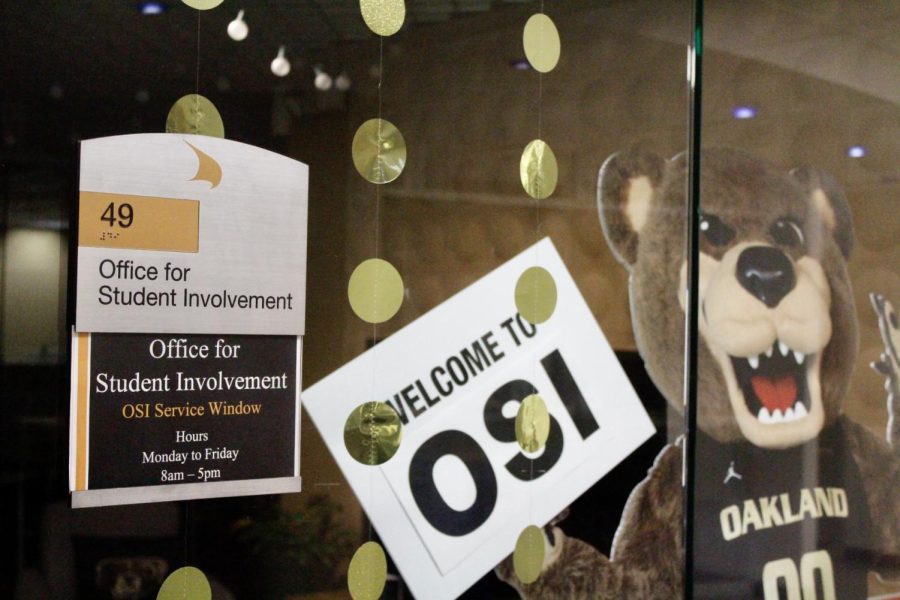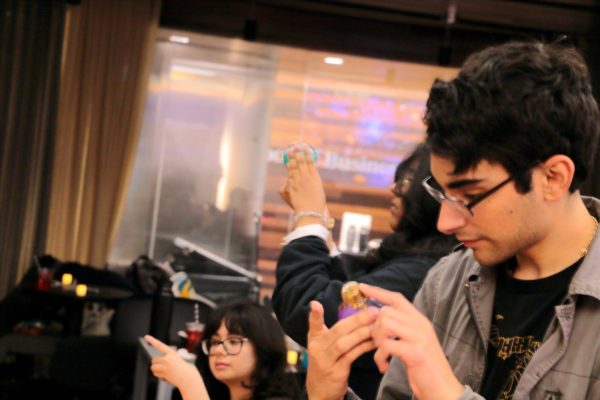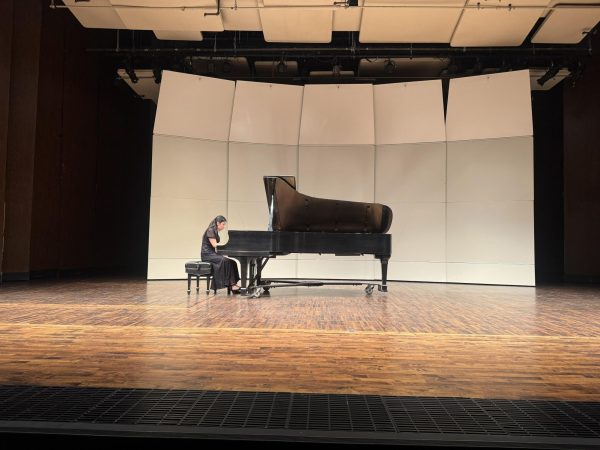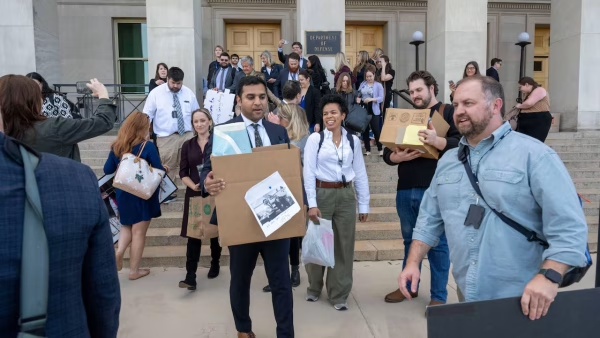Student Body President concerned over OSI spending SAFAC dollars
The outside of OSI’s office downstairs in the Oakland Center. OUSC President Andrew Romano is asking questions about how the department is spending tuition dollars.
Questions are being raised about the transfer of tens of thousands of dollars since June from Oakland University’s Student Activity Fund Assessment Committee (SAFAC) organizations to the Office for Student Involvement (OSI).
The funds, solicited by OSI Director Jean Ann Miller and her staff, have been used specifically to cover payroll of OSI employees and offset budget deficits of OSI departments.
SAFAC orgs are the largest student-run organizations at OU. They are organizations that have been historically designated by students as being important enough to receive small portions of the stipend of tuition collected from every student (currently $28.50 per semester) to perform specific tasks that serve the campus community.
For instance: The Oakland Post receives funds to publish a student newspaper, WXOU receives funds to run a student radio station, Student Program Board (SPB) receives funds to coordinate events for students and so on.
SAFAC orgs rely on the tuition dollars they’re allocated to succeed in their missions. The revelation that OSI asked for and received some of those funds was concerning to newly elected Oakland University Student Congress (OUSC) President Andrew Romano.
“I was kind of shocked,” Romano said. “Student orgs I know for a fact come [to OUSC] all the time and they’re like, oh, like we’re getting denied funding [because Student Activities Finance Board (SAFB) said] this isn’t benefiting the students enough so they’re not gonna fund [it]. So then hearing the OSI was getting $10,000 from SAFB when they’re not a student org was a little bit shocking.”
Financial records indicate that OSI received $10,000 from the SPB on June 10. On June 14, another $10,000 was transferred to OSI’s account from SAFB’s account. Records indicate that this money was used by OSI to cover payroll, though it is unclear exactly whose pay was covered as OSI employs both professional university employees and student workers.
The Post approached Miller for an interview regarding this situation on Oct. 27. She did not respond to our request. On Nov. 9, Vice President of Student Affairs and Chief Diversity Officer Glenn McIntosh was also contacted about an interview. The request sent to McIntosh made it clear that OSI had solicited funds from SAFAC orgs and that Miller hadn’t responded to our interview request. McIntosh never responded to the request.
While Miller and McIntosh never responded to The Post’s interview requests, Miller did provide the following statement on Nov. 14.
“The Office for Student Involvement did not solicit tens of thousands of dollars from the SAFAC organizations. Student Program Board (SPB) and Student Activities Funding Board (SAFB) approved a one-time funding in April 2021 for the Office for Student Involvement. The funding is being used to enhance the resources and services available to student organizations to function more effectively and efficiently and engage students by offering more diverse campus programming opportunities since returning to campus in person this fall.”
The financial aspects of Miller’s statement are complicated by a couple different facts. No. 1, the one-time payments OSI solicited and received from SPB and SAFB totaled $20,000, which is quite literally tens of thousands of dollars. The second complication is that meeting minutes from SAFB meetings held last March and August indicate that OSI has asked for more than just those one-time payments.
March 17 meeting minutes outline statements from OSI employees and SAFB advisors Stephanie Jurva and Mariah Mortellaro about how OSI would be asking for funds to offset budget cuts. Meeting minutes from March 24 outline that OSI was requesting $15,000 to $18,000 from OUSC, SPB and SAFB to cover staffing. A sponsorship to OSI of 1% of SAFB’s SAFAC allocation going forward was also discussed at the meeting.
Meeting minutes from the Aug. 9 SAFB meeting outline another $14,507.73 that OSI was requesting from SAFB for its Leadership and Service budget. Of that $14,507.73, the request detailed $7,040 going to payroll, $2,920 going to service and $4,425 going to leadership.
The OSI’s functional relationship with the SAFAC orgs is to provide resources and administrative services. OSI processes payroll for student workers in the SAFAC orgs. It processes financial transactions made with SAFAC org accounts, and OSI employees answer questions and supply assistance to student leaders when necessary.
Of the SAFAC tuition allocation money — Special Projects Fund receives 1%, Student Video Productions receives 4%, Club Sports receives 6%, SAFB receives 27%, SPB receives 27%, OUSC receives 15%, The Oakland Post receives 7%, Student Life Lecture Board receives 3% and WXOU receives 10%.
It’s worth noting that, while OSI can lobby for funds, it is not authorized to just take money from the SAFAC orgs. Any transfer of funds from a SAFAC org has to be approved by that org’s leadership beforehand. Leadership of SAFAC orgs consists of students and non-student advisors who are typically either OU AAUP faculty or university employees.
While students are ultimately in charge of making the decisions in SAFAC orgs, advisors do have considerable influence over how an organization operates. Advisors are a relative constant, often spending years advising an organization, while students in leadership positions with an org fluctuate on a yearly basis.
Presently, the three SAFAC orgs with the largest percent allocation — SPB, SAFB and OUSC — are all advised exclusively by OSI staff. This means that 69% of the total SAFAC allocation is exclusively in the advising hands of the OSI. OUSC is advised directly by Miller.
OUSC is important generally because it serves as a governing body that is designed to represent students. It is the only SAFAC org with leaders democratically elected by the student body, and the only SAFAC org with the authority to set standards for the rest of the SAFAC orgs. In the context of this story, OUSC is important because the organization has had an extraordinarily unusual year.
A controversy over unpaid workers caused unprecedented turnover with leadership positions in OUSC at the beginning of the fall semester. As adviser, Miller was actively resistant to OUSC Legislators receiving wages for the hours they were working. This suppression of wages led directly to a Legislator strike and ultimately an exodus of Executive Board members from the organization.
Following the strike, Romano and his running mate Murryum Farooqi were elected last month in the first OUSC special election since 1982. Romano realized relatively early on that OSI had obtained the $10,000 contributions from both SPB and SAFB. This was a red flag because SAFB’s constitution explicitly forbids it from funding any departments and OSI is a department.
SAFB exists almost exclusively to provide funds to GrizzOrgs. During the summer semesters when these transactions took place, SAFB provided approximately $5,600 to student orgs while approximately $24,000 was solicited from them by OSI.
As SAFB is under the jurisdiction of OUSC, Romano and his staff sought answers about the situation. Things took a turn once he started asking questions.
“When I did ask [Miller] about it the first time, she acted like I was crazy,” Romano said. “She was like, ‘Oh, my God, I don’t know what you’re talking about.’ When I asked her about the $10,000 she said, ‘Andrew, I don’t know what you’re talking about.’ Then when I kept asking … and pestering them … Then she said she’d have to look into it.”
In a meeting last month, OUSC leadership confronted Miller about the $10,000 that was transferred from SAFB to OSI. They explained that SAFB providing the funds was a violation of their constitution and asked why OSI would be breaking the org’s rules.
Miller responded saying, “It was a decision between OSI and SAFB, no other groups, about helping with funding for the staffing in OSI of staff that directly assist with student organizations … to make sure that there were resources and services provided to student organizations.”
OUSC ultimately argued that according to SAFB’s constitution the $10,000 should be returned. Miller responded saying that there was precedent and similar transfers had occurred in the past. OUSC argued that precedents of constitution breaking aren’t valid and the money should be returned. Miller then stated that OSI didn’t have $10,000 to just give back.
Following this interaction, Romano was struck by what OUSC leaders viewed as an example of a lack of transparency from OSI. Their belief is that there had been a concerted effort to conceal the fact that these transactions had taken place, and that that effort was part of a trend of OSI being less than forthright with SAFAC orgs about important information relating to their orgs.
“I think there’s a lot of secrecy going around,” Romano said. “… It’s like you’re pulling teeth for answers. It limits the ability of [SAFAC] to do things and work with each other when we don’t know how our other orgs work. [When] we don’t know how funding works. [When] we don’t know where the money is. [When] we don’t know where the money’s going. Why is that such [a] secret?”
Since the $10,000 SAFB transaction to OSI has become an issue, Miller has told OUSC staff that she’s been advised not to discuss the transaction any longer. It is unclear who would be advising Miller to be less than transparent with a SAFAC org about matters concerning their finances.
While the sums solicited from SPB and SAFB are large enough to stand out, the phenomenon of Miller asking SAFAC orgs for money is not new. It has been common practice for OSI to solicit money from the SAFAC orgs in smaller sums for their campus events for years now. The events are presented by Miller during SAFAC meetings as occasions where everyone has to chip in. While providing money isn’t a hard requirement, there is pressure to contribute.
For this September’s OSI All Night Party, SAFAC orgs were solicited and contributed upwards of $15,000 toward the event. Roughly half of this money came from SPB, which to be fair is an organization specifically designed to program events from students. Still, several thousand dollars came from organizations not specifically intended to host events. SAFB, which isn’t supposed to be doing anything except funding GrizzOrgs, contributed at least $5,000.
The reason Miller has indicated for soliciting and receiving these sums of money from the SAFAC orgs is that there are budgetary concerns.
“She told me Student Affairs didn’t give her enough money,” Romano said. “So she had to ‘get creative with funding’ to find the funds elsewhere for payroll.”
Miller’s assertion that OSI has solicited the funds to help offset budget cuts is interesting. While the OU transparency report indicates a decrease in funding for student services from $26,510,423 during the 2018-2019 school year to $24,721,864 in 2019-2020, it is unclear whether that decrease affected the OSI’s allocation from the general fund. Regardless, this reasoning didn’t sit well with OUSC leaders.
“It just doesn’t make sense to me,” Romano said. “Because it’s like, with SAFAC orgs, we would never go to the OSI and say, ‘Hey, we didn’t budget correctly, we now need money to pay our workers.’ So it seems irresponsible … I wouldn’t be allowed to go to them [for $10,000]. Why are they able to go to us?”
These recent transactions from SAFAC orgs to the OSI have raised questions about how ethical it is for Miller and her staff to be coming to the SAFAC orgs they advise for money.
“I know the power dynamics,” Romano said. “… Advisors, inherently they’re adults and students just gravitate to them. So you see this inherent power dynamic … students are more willing to trust them right away. And sometimes that power dynamic can be bad … You would never think somebody who’s called the adviser, who’s an adult, [that] they were misleading you or had bad intentions in mind. Students really thought they were helping by giving OSI $10,000 … Without knowing the full implications that this money should be going to students, not to staff for the OSI.”
(For full transparency: As Editor-in-Chief of The Oakland Post I am in-effect the president of a SAFAC org. Meaning I’m a representative of students and student workers, and I interact with OSI staff and members of other SAFAC orgs on a regular basis.)









How far OUSC has fallen • Nov 24, 2021 at 5:42 PM
I remember when OUSC leaders were active and visible across campus doing work to improve the lives of students. Instead, there’s nothing but personal drama, accusations, and misinformation this year. For example, I’ve encountered OUSC leadership this year that isn’t aware that policies they were proposing have existed for years on campus.
Andrew Romano • Nov 24, 2021 at 7:50 PM
You should read about our affordable textbook campaign. OUSC has actually donated to the ACMI initiative helping to invest in converting courses to use low cost course materials. I’m sorry to hear that some people haven’t been fully knowledgable of everything going on at this University, OUSC has newer members, we all learn over time. However, the initiatives I’ve witnessed being proposed are not being done already. For example: having no school on election day, creating an office for sustainability, having an inclusive font policy, and more.
Bob Sacamano • Nov 24, 2021 at 10:05 AM
Jean Ann was also actively trying to eliminate WXOU in early 2020. That’s starting to make more sense now.
Anonn • Nov 24, 2021 at 1:17 AM
I guess it makes sense why she didn’t want legislators to be payed… she was trying to save that money for her department to take.
Anon • Nov 23, 2021 at 7:57 PM
Sunlight is the best disinfectant. Thanks to Jeff and the team for all their wonderful work.
Griz • Nov 23, 2021 at 7:18 PM
Jean Ann is a gem who played an integral role in my development as a young adult. It’s unfortunate to see her and her office being accused of seeking help during tough times. The OSI exists so that student orgs and campus involvement occurs to provide a well rounded, developmental environment for OU students. If the office is seeking funds from its supporting orgs, clearly they need the help of the golden grizzly family, not it’s ridicule.
Common Sense • Nov 24, 2021 at 1:14 AM
Embarrassing you would encourage someone to use their position as an advisor as a lucrative way to extract money from the an organization. All because they can’t budget correctly. If she needs money she should talk to her boss and request more money. She shouldn’t have asked students. It’s very clear your “gem” did play an integral role in your development… she corrupted you clearly.